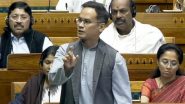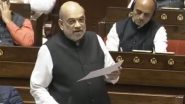United Nations, Sep 22 (AP) Azerbaijan regained control of its breakaway region of Nagorno-Karabakh in a deadly two-day military offensive and held initial talks with representatives of its ethnic Armenian population on reintegrating the area into the mainly Muslim country, Azerbaijan's top diplomat told the UN Security Council on Thursday.
Foreign Minister Jeyhun Bayramov reaffirmed Azerbaijan's determination to guarantee Nagorno-Karabakh residents “all rights and freedoms” in line with the country's constitution and international human rights obligations, including safeguards for ethnic minorities.
He said the talks with Nagorno-Karabakh in the Azerbaijani city of Yevlakh will continue.
Azerbaijan's president, Ilham Aliyev, declared victory in a televised address. Bayramov said there is now “a historic opportunity" to seek better relations with Armenia after 30 years of conflict.
Nagorno-Karabakh came under the control of ethnic Armenian forces backed by the Armenian military in separatist fighting that ended in 1994. Armenian forces also took control of substantial territory around the Azerbaijani region.
Azerbaijan regained control of the surrounding territory in a six-week war with Armenia in 2020. A Russia-brokered armistice ended the war, and a contingent of 2,000 Russian peacekeepers was sent to the region to monitor it.
The agreement left the region's capital, Stepanakert, connected to Armenia only by the Lachin Corridor, along which Russian peacekeepers were supposed to ensure free movement. But a blockade by Azerbaijan deprived Nagorno-Karabakh of basic supplies for the last 10 months, until Monday, when the International Committee of the Red Cross was able to make a delivery through another route.
Armenian Foreign Minister Ararat Mirzoyan, who called for the emergency meeting of the Security Council along with France, accused Azerbaijan of an “unprovoked and well-planned military attack,” launched to coincide with this week's annual meeting of world leaders at the UN General Assembly.
“Literally the whole territory of Nagorno-Karabakh,” including Stepanakert and other cities and settlements, came under attack from intense and indiscriminate shelling, missiles, heavy artillery, banned cluster munitions, combat drones and other aircraft, he said.
Mirzoyan said the offensive targeted critical infrastructure such as electricity stations, telephone cables and internet equipment, killed more than 200 people and wounded 400 others, including women and children. More than 10,000 people fled their homes to escape the offensive, he said.
Electricity and phone service were knocked out, leaving people unable to contact each other, and “Azerbaijani troops control main roads in Nagorno-Karabakh, which makes it impossible to visit and get information on the ground,” he said.
“The Azerbaijani social media is full of calls to find the missing children and women, to rape them, dismember them and feed them to dogs,” Mirzoyan told the council.
He said the “barbarity” of Azerbaijan's aggression and deliberate targeting of the civilian population “was the final act of this tragedy aimed at the forced exodus of the people of Nagorno-Karabakh.”
What Armenia has seen, Mirzoyan said, “is not an intent anymore but clear and irrefutable evidence of a policy of ethnic cleansing and mass atrocities.”
Bayramov strongly denied the allegations of ethnic cleansing. He said representatives from Nagorno-Karabakh asked during Thursday's talks for humanitarian aid, including food and fuel for schools, hospitals and other facilities that government agencies will provide soon.
Russia's deputy UN ambassador, Dmitry Polyansky, told the council: “We need to develop a gradual roadmap to integrate the population of Nagorno-Karabakh into the constitutional order of Azerbaijan, with clear guarantees over their rights and security,”
Russia's peacekeepers will support these efforts, he said, adding that “the security and rights of Nagorno-Karabakh Armenians are of key importance.”
The quick capitulation by Nagorno-Karabakh separatists reflected their weakness from the blockade.
“The local forces, they were never strong. The Azerbaijani army is much better prepared, much better equipped. … So it was quite obvious, you know, that any military action that was to take place in that area, it would lead to the defeat of the local Armenian side,” Olesya Vartanyan, an analyst at the International Crisis Group, told The Associated Press.
Bayramov said Armenia kept more than 10,000 “armed formations” and heavy military equipment in Nagorno-Karabakh after the 2020 agreement. During the operation that started Tuesday, more than 90 of their outposts were taken, along with substantial military equipment, he said.
He held up photos of equipment he claimed was seized.
Mirzoyan urged the Security Council to demand protection for civilians in Nagorno-Karabakh; to immediately deploy a UN mission to monitor the human rights, humanitarian and security situation; to seek return of prisoners of war; and to consider deploying a UN peacekeeping force to the region.
Azerbaijan's move to reclaim control over Nagorno-Karabakh raised concerns that a full-scale war in the region could resume. The 2020 war killed over 6,700 people.
White House national security spokesman John Kirby said the US was “deeply concerned” about Azerbaijan's military actions and was closely watching the humanitarian situation in Nagorno-Karabakh.
In a phone call Thursday with Aliyev, Russian President Vladimir Putin also urged that the rights and security of the Armenians in Nagorno-Karabakh should be guaranteed, according to the Tass news agency.
Aliyev apologised to Putin during the call for the deaths of Russian peacekeepers in the region Wednesday, the Kremlin said. Azerbaijan's prosecutor-general's office later said five Russian peacekeepers were shot and killed Wednesday by Azerbaijani troops who mistook them amid fog and rain for Armenian forces. One other Russian was killed by Armenian fighters.
Meanwhile, protesters rallied in the Armenian capital of Yerevan for a third day Thursday, demanding that authorities defend Armenians in Nagorno-Karabakh and calling for the resignation of Armenian Prime Minister Nikol Pashinyan. At least 46 people were arrested in a large protest outside the main government building in the city centre, police said.
The conflict has long drawn powerful regional players, including Russia and Turkiye. While Russia took on a mediating role, Turkiye threw its weight behind longtime ally Azerbaijan.
Russia has been Armenia's main economic partner and ally since the 1991 collapse of the Soviet Union and has a military base in the country.
Pashinyan, however, has been increasingly critical of Moscow's role, emphasizing its failure to protect Nagorno-Karabakh and arguing that Armenia needs to turn to the West to ensure its security. Moscow, in turn, has expressed dismay about Pashinyan's pro-Western tilt.
While many in Armenia blamed Russia for the defeat of the separatists, Moscow pointed to Pashinyan's own recognition of Nagorno-Karabakh as part of Azerbaijan.
“Undoubtedly, Karabakh is Azerbaijan's internal business,” said Kremlin spokesman Dmitry Peskov. “Azerbaijan is acting on its own territory, which was recognized by the leadership of Armenia."
French Foreign Minister Catherine Colonna condemned Azerbaijan's offensive and said it is essential that the ceasefire announced Wednesday is respected.
What is at stake, Colonna said, is whether the ethnic Armenians in Nagorno-Karabakh can continue living there with their rights and culture respected by Azerbaijan. “Today they have the responsibility for the fate of the population,” she said.
If Azerbaijan wants a peaceful and negotiated solution, Colonna said, “it must here and now provide tangible guarantees” and commit to discussions and to not using or threatening the use of force.
German Foreign Minister Annalena Baerbock also condemned Azerbaijan's military assault, which she said was launched despite the government's assurances to refrain from the use of force.
She called for a complete cessation of violence and lasting peace between Armenia and Azerbaijan that “can only be achieved at the negotiating table.”
Baerbock urged both countries to return to European Union-mediated talks. (AP)
(This is an unedited and auto-generated story from Syndicated News feed, LatestLY Staff may not have modified or edited the content body)













 Quickly
Quickly
















